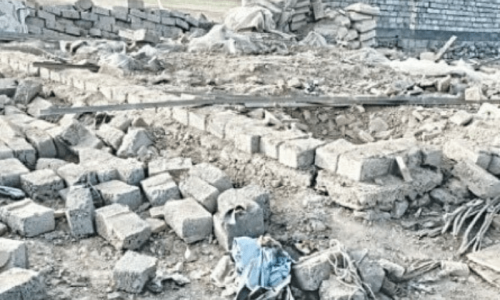PESHAWAR, Feb 13: The Khyber Pakhtunkhwa government’s new guidelines for the visit of expatriate workers to sensitive districts in the province have irritated the United Nations agencies and international humanitarian organisations involved in relief activities.
Sources have told Dawn that the United Nations Office for the Coordination of Humanitarian Affairs, which coordinates relief activities of the UN agencies and other international humanitarian bodies in Pakistan, have expressed serious reservations about the directives.
“The humanitarian community in Pakistan has serious concerns over these directives, which will have negative impact on accountability to the affected population in Khyber Pakhtunkhwa and Federally Administered Tribal Area,” the UN body’s chief said in a letter written to the head of the Provincial Disaster Management Authority.
UNCHA cautioned the government that any kind of restriction would adversely affect funding from donors, which was critical at this point, and asked the provincial government to review the new directives. The government had placed restrictions on the movement and activities of foreign organisations and their local partners involved in relief operation in the province and Fata in the wake of the alleged fake vaccination campaign carried out by Dr Shakeel Afridi in Abbottabad, which led to the killing of Osama bin Laden on May 2, 2011.
Sources said after the Osama episode, the government began suspecting involvement of staffers of western NGOs in espionage in the guise of relief activities. International Committee of the Red Cross had squeezed its activities in the region following restrictions.
The interior ministry had also expelled foreign workers of Save the Children last year after reports that the organisation was involved in facilitating Dr Afridi.
A senior official said the policy guidelines might force international humanitarian organisations to curtail relief, rehabilitation and reconstruction activities in the province and tribal areas.
“Baggers can’t be choosers because millions of people affected by the natural disasters and conflicts are beneficiaries of the UN agencies, foreign donors and their local partners,” he said.
The official said the government had already chalked out a policy for the movement of INGOs workers in the province and Fata and NoCs were issued after scrutiny by the 11th Corps and other state agencies.
The provincial home and tribal affairs had notified last week that humanitarian bodies would have to submit their requests for obtaining No Objection Certificates six to eight weeks prior to their visits of project sites in ten districts of the province.The districts where staff of the foreign relief bodies, international non governmental organisations and local NGOs would have to get permission six to eight weeks before their visit are Lower Dir, Upper Dir, Shangla, Buner, Malakand, Swat, Chitral, Hangu, Tank and Dera Ismail Khan. The decision will also be binding on employees of the firms and foreign tourists. The official statement said these guidelines had been introduced to avoid insufficient information, resulting in unnecessary correspondence and delay in processing of cases.
For the purpose, three new working forms had been adopted and directed the Provincial Disaster Management Authority and Provincial Reconstruction, Rehabilitation and Settlement Authority to inform all the local and International NGOs to send their requests after completing the requirements as New govt guidelines don’t sit right with UN agencies indicated in these forms to the provincial home and tribal affairs department for the purpose of visiting the project sites in ten districts of the province.
The NGOs working in districts like Dir Lower ,Dir Upper, Shangla, Buner, Malakand, Swat and Chitral and three Southern district like Hangu, Tank and Dera Ismail Khan need to fill these forms for grant of NoCs for visiting the project sites in these ten districts at least six to eight weeks in advance for timely processing of such cases.
The visitors would also mention all particulars in the form including name, father’s name, designation, religion, passport number, duration of stay of foreigners in Pakistan, residential address and his/her contact number in foreign country.
Pakistani nationals working for NGOs, INGOs and firms are required to submit computerised national identity cards duly issued by the National Database Registration Authority.
According to the sources, the UN body believes that the new procedure will affect humanitarian access to the affected population and quality of service in the province and Fata.
It said monitoring of the ongoing activities and accountability to the donors would also be compromised while these guidelines would create hindrance in operational plan for the current year for return and early recovery activities in affected districts.













































Dear visitor, the comments section is undergoing an overhaul and will return soon.